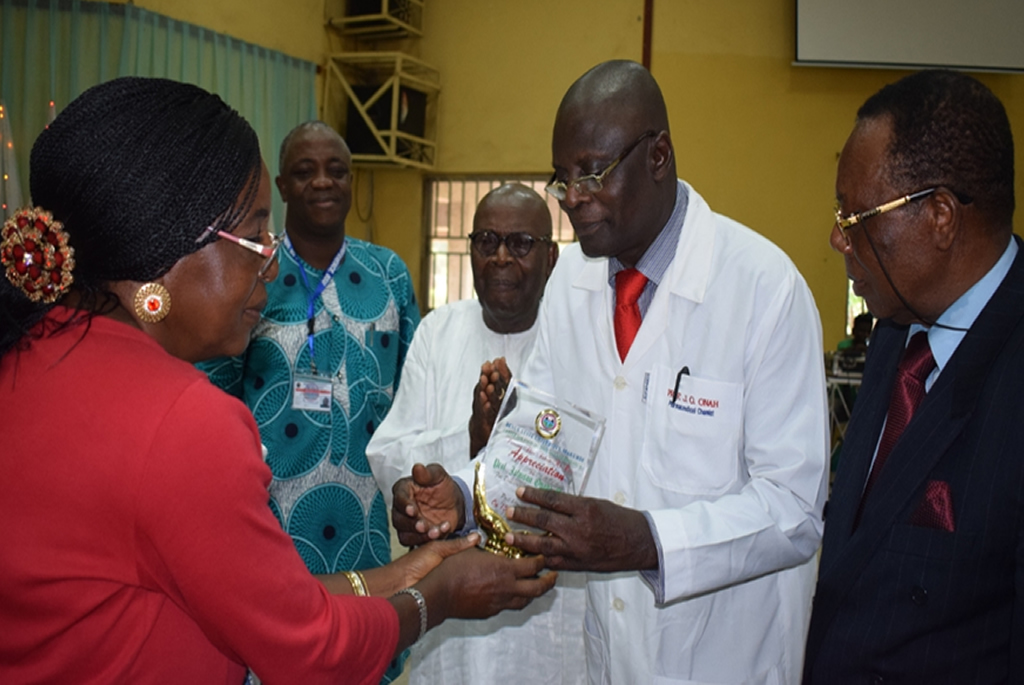- 11
- Oct.
Nanotechnology: Towards achieving Food Security and Preservation

Representative of the Governing Council on the Board of CEFTER, Mrs Sarah Amahson, presenting an Award of Appreciation to Professor Johnson O. Onah while Professor Omudu, the Deputy Vice-Chancellor Academic and Professor Daniel Adezwa look on.
Centre for Food Technology and Research CEFTER, Benue State University may take the lead in nanotechnology research to manage post-harvest losses and solve food security issues in Nigeria and the sub-region.
CEFTER leadership in Nanotechnology research is possible if Benue State University heeds the appeal by Professor Johnson Ogoda Onah, to consider expanding the activities of CEFTER to cover research in Nanotechnology as one of improved technologies for food preservation and management.
Professor Onah, a Professor of Pharmaceutical and Medicinal Chemistry, University of Jos made the appeal recently at a Special Public Lecture organized by CEFTER titled “Post-Harvest Management of Foods from Nanotechnology perspective” held at College of Health Sciences Auditorium, Benue State University Makurdi.
According to Professor Onah, “Nano Technology innovation is the new thing in town because of its sophistry, adaptability and cost-effectiveness”. He pointed out that currently, there is no institution that he is aware that is engaged in research in nanotechnology in Nigeria even though the principles have all been denied from existing knowledge of Chemistry, Physics and engineering.
He emphasized that the simple logic behind food preservation, which is the first step in food management is to extend the shelf life of the product. The history of food preservation and the numerous techniques employed according to him have evolved over the years because of the need to conserve resources and control waste.
He however stressed that “the application of nanotechnology to food industry is relatively recent and it is growing extremely rapidly. The pre and post-harvest issues surrounding agricultural produce is being addressed by this new technique with staggering results if this technology is initiated in Nigeria just like India, the issue of food security can be addressed within a decade or two inspite of the climatic conditions. Professor further maintained that “with nanotechnology, the shelf life of foods can be increased several folds, the quality and quantity can tremendously be improved upon; storage and equitable distribution can be achieved economically”.
He was of the opinion that for a developing country like Nigeria, the need for nanotechnology research for agriculture purpose cannot be over emphasized because of its suitability for rural peasant farmers who constitute 60 to 70% of Nigeria’s farming population. Considering the country’s desire to attain food security ever increasing population and pressure from climatic changes, “the time for Nigerians to get involved with nanotechnology research generally is now”.
He outlined some of the benefits of nanotechnology as adding greater efficiency Agricultural activities; improving food and nutritional quality; and leading to fabrication of devices that can easily detect contaminants like chemical and microbiological agents.
According to Professor Onah, nanotechnology has performed wonderfully as regards food preservation, processing, packaging, storage, distribution and delivery but advised that, as applied to agricultural and food management, CEFTER should limit it to their practical activities because innovation is the basic principle.
